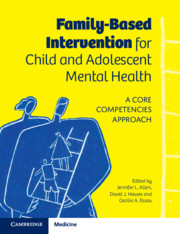Book contents
- Family-Based Intervention for Child and Adolescent Mental Health
- Family-Based Intervention for Child and Adolescent Mental Health
- Copyright page
- Contents
- Contributors
- Preface
- Part I Theoretical Perspectives on Family-Based Intervention
- Part II Core Clinical Competencies
- Part III Family Intervention for Specific Child and Adolescent Mental Health Problems
- Part IV Family Intervention for Children at Risk Due to Family Dysfunction or Past Adversity
- Part V New Developments in Family-Based Intervention
- Chapter 20 Tuning in to Kids: An Emotion Coaching Approach to Working with Parents
- Chapter 21 Emotion Coaching in the Context of Intimate Partner Violence
- Index
- References
Chapter 20 - Tuning in to Kids: An Emotion Coaching Approach to Working with Parents
from Part V - New Developments in Family-Based Intervention
Published online by Cambridge University Press: 18 February 2021
- Family-Based Intervention for Child and Adolescent Mental Health
- Family-Based Intervention for Child and Adolescent Mental Health
- Copyright page
- Contents
- Contributors
- Preface
- Part I Theoretical Perspectives on Family-Based Intervention
- Part II Core Clinical Competencies
- Part III Family Intervention for Specific Child and Adolescent Mental Health Problems
- Part IV Family Intervention for Children at Risk Due to Family Dysfunction or Past Adversity
- Part V New Developments in Family-Based Intervention
- Chapter 20 Tuning in to Kids: An Emotion Coaching Approach to Working with Parents
- Chapter 21 Emotion Coaching in the Context of Intimate Partner Violence
- Index
- References
Summary
In this chapter we outline how an emotion coaching approach to working with parents can be used in child and adolescent mental health work. In particular, we describe the theory and empirical research in relation to parent emotion socialization (i.e., parent emotion regulation, reactions to children’s emotions and emotion coaching) and how we have used this theory in an evidence-based intervention called Tuning in to Kids (TIK). Then, using our TIK approach to teaching emotion coaching, we provide detail about how components or steps of emotion coaching can be used in clinical work, explore barriers and challenges that are often encountered in using these and outline a case study to illustrate the main principles. A discussion is also included about addressing the emotion competence of parents in a parallel process that is important to include alongside the parenting skills. Lastly, we discuss how factors within both the clinician and the service system contribute to effective application of this emotion-focused approach to parenting intervention.
Keywords
- Type
- Chapter
- Information
- Family-Based Intervention for Child and Adolescent Mental HealthA Core Competencies Approach, pp. 269 - 283Publisher: Cambridge University PressPrint publication year: 2021
References
- 4
- Cited by



